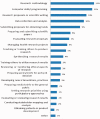Human resources in health research institutions in sub-Saharan African countries: results of a questionnaire-based survey
- PMID: 24914131
- PMCID: PMC4109356
- DOI: 10.1177/0141076814530602
Human resources in health research institutions in sub-Saharan African countries: results of a questionnaire-based survey
Abstract
Objective: To describe human capacity and staff movement in national health research institutions in 42 sub-Saharan African countries.
Design: A structured questionnaire was used to solicit information on governance and stewardship from health research institutions.
Setting: Eight hundred and forty-seven health research institutions in 42 sub-Saharan African countries.
Participants: Key informants from 847 health research institutions.
Main outcome measures: The availability, mix and quality of human resources in health research institutions.
Results: On average, there were 122 females employed per respondent health research institution, compared with 159 males. For researchers, the equivalent figures were nine females to 17 males. The average annual gross salary of researchers varied between US$ 12,260 for staff with 5-10 years of experience and US$ 14,772 for the institution head. Of those researchers who had joined the institution in the previous 12 months, 55% were employed on a full-time basis. Of the researchers who left the institutions in the same period, 71% had a full-time contract. Among all those who left, those who left to a non-research sector and to another country accounted for two-thirds.
Conclusions: The study revealed significant gaps in the area of human capacity development for research in Africa. The results showed a serious shortage of qualified staff engaged in health research, with a dearth of staff that held at least a master's degree or doctoral degree. Major efforts will be required to strengthen human resource capacity, including addressing the lack of motivation or time for research on the part of existing capable staff.
Keywords: health research in Africa; health research institutions; health research workforce; human resource for research.
© The Royal Society of Medicine.
Figures



References
-
- World Health Organization. The World Health Report 2008: Primary Health Care Now More Than Ever, Geneva: World Health Organization, 2008.
-
- Chen L, Evans T, Anand S. Human resources for health: overcoming the crisis. The Lancet 2004; 364: 1984–90. - PubMed
-
- United States Agency for International Development. The Health Sector Human Resource Crisis in Africa: An Issues Paper, Washington, DC: United States Agency for International Development, Bureau for Africa, Office of Sustainable Development, 2003.
Grants and funding
LinkOut - more resources
Full Text Sources
Other Literature Sources

